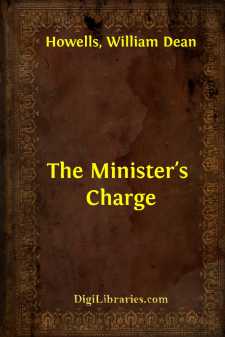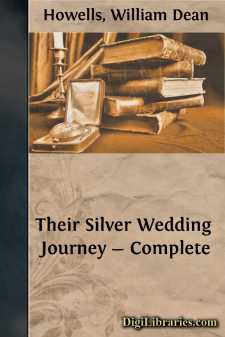Categories
- Antiques & Collectibles 13
- Architecture 36
- Art 48
- Bibles 22
- Biography & Autobiography 813
- Body, Mind & Spirit 142
- Business & Economics 28
- Children's Books 15
- Children's Fiction 12
- Computers 4
- Cooking 94
- Crafts & Hobbies 4
- Drama 346
- Education 46
- Family & Relationships 57
- Fiction 11828
- Games 19
- Gardening 17
- Health & Fitness 34
- History 1377
- House & Home 1
- Humor 147
- Juvenile Fiction 1873
- Juvenile Nonfiction 202
- Language Arts & Disciplines 88
- Law 16
- Literary Collections 686
- Literary Criticism 179
- Mathematics 13
- Medical 41
- Music 40
- Nature 179
- Non-Classifiable 1768
- Performing Arts 7
- Periodicals 1453
- Philosophy 64
- Photography 2
- Poetry 896
- Political Science 203
- Psychology 42
- Reference 154
- Religion 513
- Science 126
- Self-Help 84
- Social Science 81
- Sports & Recreation 34
- Study Aids 3
- Technology & Engineering 59
- Transportation 23
- Travel 463
- True Crime 29
The Minister's Charge
Description:
Excerpt
I.
On their way back to the farm-house where they were boarding, Sewell's wife reproached him for what she called his recklessness. "You had no right," she said, "to give the poor boy false hopes. You ought to have discouraged him—that would have been the most merciful way—if you knew the poetry was bad. Now, he will go on building all sorts of castles in the air on your praise, and sooner or later they will come tumbling about his ears—just to gratify your passion for saying pleasant things to people."
"I wish you had a passion for saying pleasant things to me, my dear," suggested her husband evasively.
"Oh, a nice time I should have!"
"I don't know about your nice time, but I feel pretty certain of my own. How do you know—Oh, do get up, you implacable cripple!" he broke off to the lame mare he was driving, and pulled at the reins.
"Don't saw her mouth!" cried Mrs. Sewell.
"Well, let her get up, then, and I won't. I don't like to saw her mouth; but I have to do something when you come down on me with your interminable consequences. I dare say the boy will never think of my praise again. And besides, as I was saying when this animal interrupted me with her ill-timed attempts at grazing, how do you know that I knew the poetry was bad?"
"How? By the sound of your voice. I could tell you were dishonest in the dark, David."
"Perhaps the boy knew that I was dishonest too," suggested Sewell.
"Oh no, he didn't. I could see that he pinned his faith to every syllable."
"He used a quantity of pins, then; for I was particularly profuse of syllables. I find that it requires no end of them to make the worse appear the better reason to a poet who reads his own verses to you. But come, now, Lucy, let me off a syllable or two. I—I have a conscience, you know well enough, and if I thought—But pshaw! I've merely cheered a lonely hour for the boy, and he'll go back to hoeing potatoes to-morrow, and that will be the end of it."
"I hope that will be the end of it," said Mrs. Sewell, with the darkling reserve of ladies intimate with the designs of Providence.
"Well," argued her husband, who was trying to keep the matter from being serious, "perhaps he may turn out a poet yet. You never can tell where the lightning is going to strike. He has some idea of rhyme, and some perception of reason, and—yes, some of the lines were musical. His general attitude reminded me of Piers Plowman. Didn't he recall Piers Plowman to you?"
"I'm glad you can console yourself in that way, David," said his wife relentlessly.
The mare stopped again, and Sewell looked over his shoulder at the house, now black in the twilight, on the crest of the low hill across the hollow behind them. "I declare," he said, "the loneliness of that place almost broke my heart. There!" he added, as the faint sickle gleamed in the sky above the roof, "I've got the new moon right over my left shoulder for my pains. That's what comes of having a sympathetic nature."
* * * * *
The boy was looking at the new moon, across the broken gate which stopped the largest gap in the tumbled stone wall....












